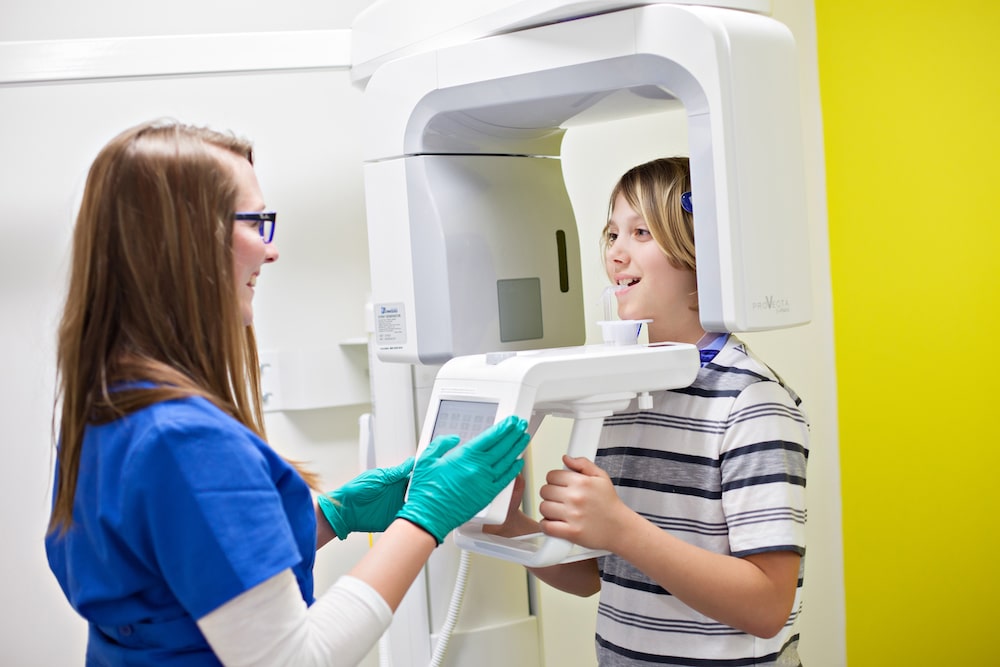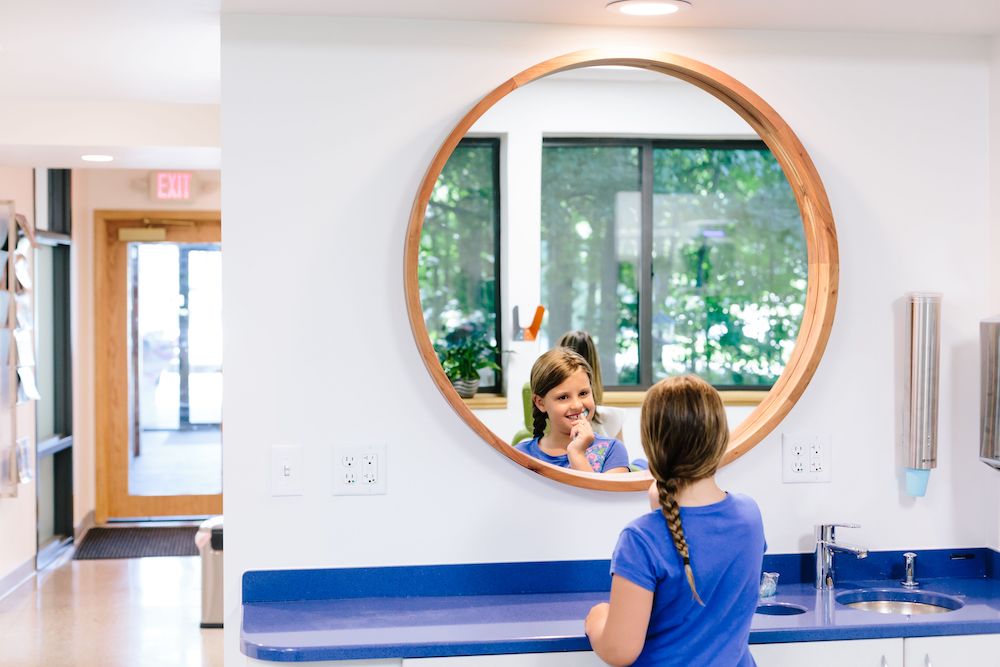I’ve Been Going to Orthodontists for Over a Decade. Here’s How to Choose the Best One
Hey there, I’m Michelle, a local mom of six, and I’m going to share some of my experiences with braces, as well as some new information I’ve recently learned from Byron Center orthodontist Kevin Knapp.
It will sneak up on you, but sooner or later most parents hit the beloved milestone of paying for a kid to get braces. And with it comes the tricky task of finding the best orthodontist for your family.
I actually got braces when I was pregnant because I was tired of covering up my crooked lower teeth whenever I spoke.
Now, after walking four of my kids through braces treatment (yes, I passed on those excellent teeth genes!), I know a thing or two about what makes a good orthodontist.
When you’re investing in something as major as orthodontics it’s important to figure out what makes a good orthodontist. If you’re going to be trusting your child’s teeth (and face) to someone, as well as making a substantial financial investment in braces, you want someone reliable, experienced, and knowledgeable.

So, Where Do You Start? Look for These 5 things When You Choose an Orthodontist
One way to find a local orthodontist is to start asking around, which is what I did. Friends who have gone before you are a great resource. They can help you learn about the process and recommend the orthodontists they’ve chosen for their families.
After you’ve talked to your friends, it’s time to see what the experts say. I checked in with Dr. Kevin Knapp of Knapp Orthodontists in Byron Center and he shared these insightful tips with me.
Tip One: Make Sure the Doctor is a Member of the American Association of Orthodontics
Dr. Knapp says this is the best way to filter out who should do your treatment.
In fact, this is his number one rule for finding a qualified orthodontist.
Members of the AAO are dentists who completed a 3-year residency program specializing in orthodontics after dental school. They are certified once they pass a licensing exam for each state.

“Seek out an orthodontic specialist to provide orthodontic care for your family,” advises Knapp.
“There are some dentists that market themselves that they do orthodontics. That may be a Jack-of-all-trades, master-of-none situation. Orthodontics is the single aspect of dentistry that orthodontists practice each and every day.”
It would never occur to me to go to a dentist who was not fully trained and licensed to do orthodontic work. I’m not sure if someone would do this for convenience or to save money, but it doesn’t sound like a good investment.
Tip Two: Pick Someone Who Works Well with Your Family
There should be good communication directly between the orthodontist and the parent. A child should never be expected to relay information to the parent.
This happened to me with one of my daughters. I spent the entire treatment period (which is often one to two years long) getting updates solely from my teen, who was not always the best at relaying information. After the initial consultation, I never saw the orthodontist again. I don’t even remember what he looks like.
This is not how Dr. Knapp does orthodontics.

“I’m not a walk-in, walk-out office,” says Dr. Knapp.
“We always communicate to the family in the waiting room what was done at each appointment and what is planned for the next appointment, even if it is as simple as changing a wire and talking about rubber bands. That brief interaction is important.”
Patients and families have a lot of interaction with Dr. Knapp, which he says is crucial to the day-to-day running of his office.
This really makes a huge difference in the experience. A likable, professional presence throughout your child’s treatment makes having braces much more pleasant.
“They see me a lot. I come up front, and I will check people in. I answer the phone sometimes. I come into the waiting room, and I will sit on the couches and talk to people there.”
This is not typical for an orthodontist. But, I love it.
Tip Three: Location is Important, to a Point
Finding an office with a convenient location is important since you will be traveling there frequently. Often, initial appointments are closer together, while appointments for the majority of the treatment are every four to six weeks.
However, if you find an orthodontist you really like who isn’t nearby, the drive may be worth it. The closest orthodontist won’t necessarily be the best fit for you, so decide how important close proximity is before choosing an orthodontist. There aren’t any orthodontists near my home, so I need to factor in drive time no matter what.
Additionally, make sure the office offers appointment hours during the times and days that you are also available. Dr. Knapp’s office is located conveniently near Byron Center schools, and they also offer evening hour appointments.

Tip Four: Look for a Clean, Modern Office With a Practical View of Technology
Technology changes pretty quickly so think twice before using an orthodontist who is an early technology adopter. Why is this important? Essentially, you don’t want to be the patient getting everything new tried out on you.
Look for an orthodontist with a good balance of using proven methods while also looking forward to the newest technology.
“You don’t want anyone stuck in the Stone Age still doing mouth impressions on patients, of course, but also, not someone who is implementing every new thing right away. Let the technology work some of the kinks out,” advises Dr. Knapp.
Dr. Knapp says every few years his office critically evaluates their systems while asking the question: Is there a piece of technology that can make the patient’s experience more enjoyable, efficient, or cost effective?
Yearly the AAO holds an annual session where orthodontists from around the world spend four days together, sharing new technology and research.
I, for one, am thankful that mouth impressions are obsolete, and I welcome the easier, less painful and stressful ways that orthodontics has changed even since I had them about 14 years ago.
Tip Five: Look for an Orthodontist Who Cares About Giving You a Good Experience
Dr. Knapp has a unique way of looking at his role as an orthodontist and orthodontics in general. The patient’s experience, as well as the final outcome, are tantamount to what he does.
“Orthodontics is like a story, and it’s almost like a little book review each time. Each experience creates value for you being here.
“If it looks like all we are doing back there is changing the color of the ties, then we are not creating value for you,” Dr. Knapp says.
Some questions Dr. Knapp says parents can use to evaluate an orthodontist are:
- How did I feel when I left the office?
- What am I coming away with from this experience?
- How did my kid feel?
- Did my kid like the orthodontist?
“We often hear that patients go to other consultations, but they say, ‘We picked you because my kid liked you.’ That’s pretty cool,” says Dr. Knapp.
Michelle Smith
Grand Rapids Kids Writer
Michelle Smith lives in Lowell with her husband. She’s an avid homeschooling parent: three of her children are homeschooling graduates and the remaining three are still at home under her tutelage. Michelle also enjoys classical ballet and live theater, especially musicals, both being in the audience and working backstage.

